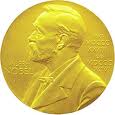Whistleblower Bradley Manning has been nominated for the Nobel Peace Prize, and he should receive it.
No individual has done more to push back against what Martin Luther King Jr. called "the madness of militarism" than Bradley Manning. The United States is the leading exporter of weapons and itself spends as much preparing for more wars as the rest of the world combined. Manning is the leading actor in opposition to U.S. warmaking, and therefore militarism around the world. What he has done has hurt the cause of violence in a number of other nations as well.
And right now, remaining in prison and facing relentless prosecution by the U.S. government, Manning is in need of the Nobel Peace Prize.
Alfred Nobel's will left funding for a prize to be awarded to "the person who shall have done the most or the best work for fraternity between nations, for the abolition or reduction of standing armies and for the holding and promotion of peace congresses."
The intent of the prize was to fund this work. As a result of enormous legal expenses, Bradley Manning is in need of that funding, unlike some other peace prize recipients. In addition, his secret trial -- with a potential death sentence -- could use all the attention that can be shined on it.
The people of the United States and the rest of the world have learned more about the intentions of the U.S. government from Bradley Manning than from anyone else. "Thanks to Manning's alleged disclosures, we have a sense of what transpired in Iraq and Afghanistan. We have an image of how Washington operates in the world," author Chase Madar wrote in his book about Manning's whistleblowing.
"Thanks to those revelations we now know just how our government leaned on the Vatican to quell opposition to the Iraq War. We now know how Washington pressured the German government to block the prosecution of CIA agents who kidnapped an innocent man, Khaled El-Masri, while he was on vacation. We know how our State Department lobbied hard to prevent a minimum wage increase in Haiti, the hemisphere's poorest nation."
Manning revealed a secret U.S. war in Yemen, U.S. records of massive civilian deaths in Iraq and Afghanistan, video of a U.S. helicopter attack on civilians and their rescuers in Baghdad, and facts about the corruption of numerous governments including those of the United States, Tunisia, and Egypt. In those last two nations Manning's revelations contributed to nonviolent pro-democracy movements.
Among the revelations made by Manning through WikiLeaks is the extent of time and energy the U.S. State Department puts into marketing U.S. weapons to the world's governments. We all have a better understanding of the work that is needed for peace as a result of this exposure of "diplomacy" as consisting so greatly of weapons selling.
The Guardian newspaper and BBC Arabic detailed last week how the United States armed and trained Iraqi police commando units that ran torture centers and death squads. Maggie O'Kane, executive producer of the documentary, said: "I hope this film will be a legacy that actually says, 'If you want to go to war, this is what war means. It means 14-year-old boys being hung up and tortured. It means men being turned on spits. And that's called counter-insurgency. ...' This would not be coming to light if it hadn't been for Bradley Manning."
Not only has Manning done the most to resist militarism, but he has done it for its own sake, and not by chance or for any ulterior motive. This is made clear by his recent statement in court and by his earlier communications in the chat logs that have long been a part of his case. Manning was horrified by crimes and abuses. He believed the public should know what was happening. He believed democracy was more important than blind subservience in the name of a "democracy."
Manning has been nominated for the Nobel Peace Prize by the Movement in the Icelandic Parliament, the Pirates of the EU; representatives from the Swedish Pirate Party, and the former Secretary of State in Tunisia for Sport & Youth. The nomination states, in part: "These revelations have fueled democratic uprisings around the world, including a democratic revolution in Tunisia. According to journalists, his alleged actions helped motivate the democratic Arab Spring movements, shed light on secret corporate influence on the foreign and domestic policies of European nations, and most recently contributed to the Obama Administration agreeing to withdraw all U.S. troops from the occupation in Iraq."
The Norwegian Nobel Committee (send them a note) can either begin awarding the peace prize to opponents of war or continue on its current course -- one which already has many questioning, not whether Manning is worthy of the prize, but whether the prize is worthy of Manning.





